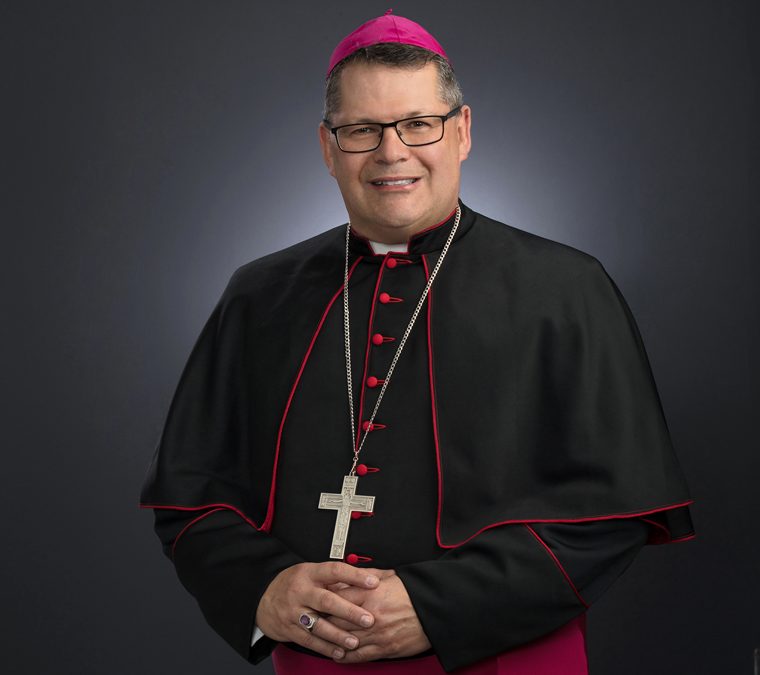Bishop Douglas J. Lucia celebrated a Good Friday liturgy at the Cathedral of the Immaculate Conception April 10. The prepared text of his homily from that liturgy appears below.
“It was about noon…
“It is the central time of the day, the point that determines the transition of one part of the day to the other. It is the midpoint of time, marking a before and an after, the midpoint of the journey, the critical crossroads of life. It is in this moment that Jesus takes us from the time of history to the time of salvation. For this reason, even if the clock marks other hours, often in our life it is noon.”
These words from a retreat conference given by Jose Cardinal Tolentino Mendoca frame for me our reflection on the Passion Narrative of John this Good Friday afternoon. In this moment, we have drawn near to Calvary and find ourselves again among the bystanders. Although time seems to stand still, the culmination of Jesus’ life is apparent, and we hear him cry out his final words: “I thirst…It is finished.”
His breathes his last… Sounds like it’s done… it’s over… he hands over his spirit. It looks like death won. The Son of Man hangs on the cross lifeless.
Others said words like those that day. Pilate pushed himself up from the judgment bench and sighed, “Jesus is finished, another political troublemaker out of the way.”
The religious leaders looked at one another and said in hushed tones, “Jesus is finished. No more offense from him.” The soldiers as they turned their backs and walked away: “Finished. It is over, our unpleasant but necessary work for the day.” The crowds as they watched Jesus breathe his last and his head slump down, lifeless: “Finished. The spectacle is over.”
All comments on the moment, comments on the day, comments made by those with limited vision. The Latin translation of Jesus’ words: “Consummatum est” hints at a different understanding of what Jesus uttered. It suggests completion…fulfillment finalized.
So also with the Greek translation of Jesus’ final words, “tetelestai.” In this instance, Jesus’ whole life is summed up in just one word… his concluding declaration, his last word, the final punctuation on a sentence begun before the beginning.
For a moment, let us return to the beginning… the prologue of the Gospel of John that is read on Christmas Day. (Probably not too difficult to do in light of today’s weather… it is as if even God’s creation is connecting our Lord’s nativity with his death.)
“In the beginning was the Word, and the Word was with God, and the Word was God. He was in the beginning with God. All things came to be through him and without him nothing came to be. What came to be through him was life and this life was the light of the human race; the light shines in the darkness and the darkness has not overcome it … And the Word became flesh and made his dwelling among us… full of grace and truth… From his fullness, we have all received grace upon grace.”
And so Jesus’ word, word of the Word incarnate, this one word, which we translate as “it is finished,” is the final punctuation on a sentence begun before all that is, before we were knit together in our mothers’ wombs, before the first light, first life, first spark, first dream, first bursting forth of creation. The final punctuation on a sentence spoken in love, spoken across space, time, through ages, prophets, patriarchs, matriarchs, sages, and in these last days, spoken to us by a son: Jesus.
The final punctuation on a sentence spoken and lived in love and given as a final commandment: “So that, as I have done for you, you should also do.” The Word incarnate spoke love in words, in deeds, spoke love in handing himself over, giving himself up, pouring himself out, until there is nothing left, nothing more needed, just one last breath, one last word… all in the noontime of life. In he whose thirst could not be quenched… in every time, we let Jesus quench our thirst, it is noon!
Brothers and sisters, as we find ourselves on Calvary again today and in ways we never expected, let us not forget God’s sentence of love on the cross: transitioning us from the time of history to the time of salvation — its final syllables, in gasps, in an agonized whisper, in pain, yes, but with precision, point, and power. This is no giving up, this is declaration: “It is finished.” “Tetelestai.” Period. Amen.






